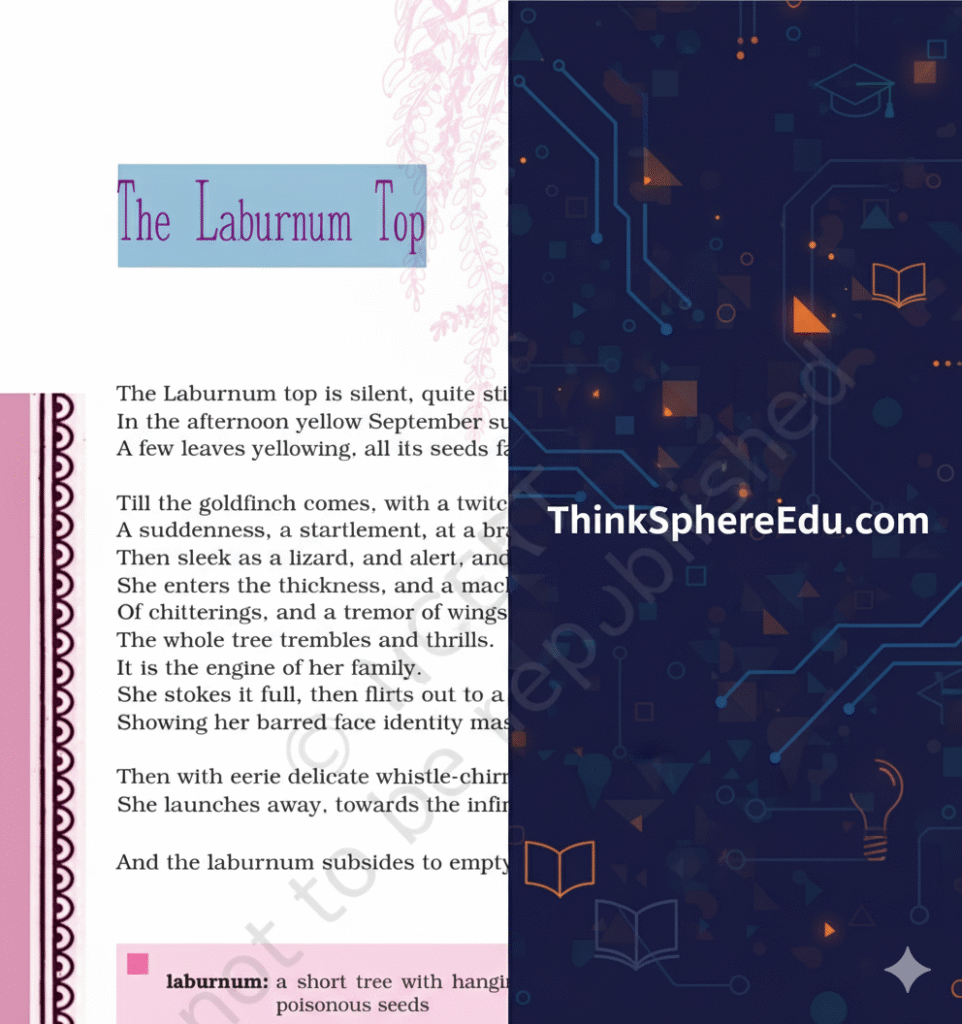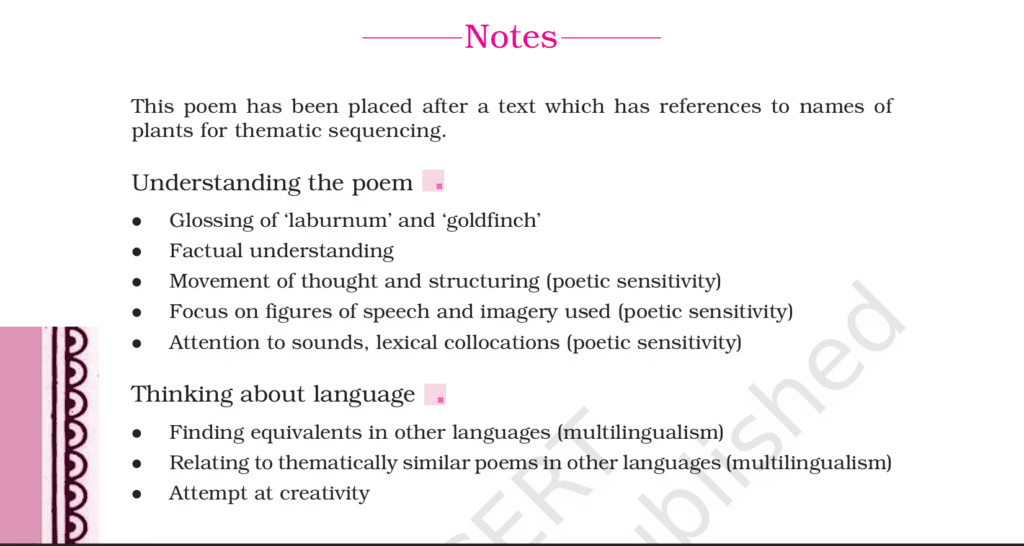
Hornbill | Class 11 The Laburnum Top Questions And Answers Solved | NCERT Solutions & Summary, it is essential for young learners to build a strong foundation in the subject, and CBSE Class 11 English Solutions, Understanding the Chapter thoroughly, helps students grasp key concepts, improve comprehension, and perform well in exams. Also, we provide The Laburnum Top Extra Questions And Answers | and NCERT Class 11 English Sample Papers.
In this article we will provide you The Laburnum Top summary in English, Hindi and Bengali.
Table of Contents
The Laburnum Top Questions And Answers Solved | NCERT Solutions & Summary
The Laburnum Top summary in English: (The Laburnum Top Questions And Answers)
The poem talks about a graceful laburnum tree in the hushed afternoon hours of September. The tree appears from a distance to be still and silent: its leaves have turned yellow, and it sheds its profuse seeds. All of a sudden, an arriving goldfinch lands with sharp, rapid chirrups.
The bird sneaks into the branches, albeit very fast and carefully, and life springs into the tree. Wings create a racket, and chirping fills the air as if the once-silent tree had suddenly sprung into life, as if it had become a living engine of activity. The bird then goes on to feed her young ones, popping up at the branch ends and showing off her masked face, only to softly call and fly away into the sky, leaving the tree again in complete silence and emptiness.
The Laburnum Top summary in Hindi: (The Laburnum Top Questions And Answers)
कविता सितंबर की शांत दोपहर में एक सुंदर लेबर्नम वृक्ष के बारे में बात करती है। दूर से देखने पर वह वृक्ष स्थिर और मौन प्रतीत होता है: उसके पत्ते पीले पड़ गए हैं और उसमें से प्रचुर मात्रा में बीज गिर रहे हैं। अचानक, एक गोल्डफिंच पक्षी तेज़, तेज़ चहचहाहट के साथ उतरता है।
चिड़िया शाखाओं पर चढ़ जाती है, हालाँकि बहुत तेज़ी और सावधानी से, और वृक्ष में जीवन का संचार हो जाता है। पंखों का शोरगुल और चहचहाहट से वातावरण ऐसा भर जाता है मानो कभी मौन रहा वृक्ष अचानक जीवन्त हो गया हो, मानो वह गतिविधि का एक जीवंत इंजन बन गया हो। फिर चिड़िया अपने बच्चों को खिलाने के लिए आगे बढ़ती है, शाखाओं के सिरों पर उछलती है और अपना नकाबपोश चेहरा दिखाती है, फिर धीरे से पुकारती है और आकाश में उड़ जाती है, वृक्ष को फिर से पूर्ण मौन और शून्य में छोड़ देती है।
The Laburnum Top summary in Bengali: (The Laburnum Top Questions And Answers)
কবিতাটিতে সেপ্টেম্বরের নিস্তব্ধ বিকেলে একটি মনোরম ল্যাবার্নাম গাছের কথা বলা হয়েছে। দূর থেকে গাছটি শান্ত এবং নীরব বলে মনে হয়: এর পাতা হলুদ হয়ে গেছে এবং এটি তার প্রচুর বীজ ঝরে ফেলে। হঠাৎ করেই, একটি আগমনকারী গোল্ডফিঞ্চ তীক্ষ্ণ, দ্রুত কিচিরমিচির শব্দে অবতরণ করে।
পাখিটি খুব দ্রুত এবং সাবধানে ডালে লুকিয়ে পড়ে, এবং গাছে জীবন প্রবাহিত হয়। ডানাগুলি একটি কোলাহল তৈরি করে এবং কিচিরমিচির বাতাসকে ভরে দেয় যেন একসময়ের নীরব গাছটি হঠাৎ করে জীবনে ফুটে উঠেছে যেন এটি কার্যকলাপের একটি জীবন্ত ইঞ্জিন হয়ে উঠেছে। পাখিটি তারপর তার বাচ্চাদের খাওয়াতে থাকে, ডালের প্রান্তে উঠে তার মুখোশযুক্ত মুখ দেখায়, কেবল মৃদুভাবে ডাকে এবং আকাশে উড়ে যায়, গাছটিকে আবার সম্পূর্ণ নীরবতা এবং শূন্যতায় রেখে যায়।
Also Read
- Class 11 English NCERT Solutions Hornbill 2025-26 | Chapter wise free pdf answers
- The Portrait of A Lady Class 11 Questions With Answers Solved
Find Out (The Laburnum Top Questions And Answers)
1. What laburnum is called in your language.
Answer:
In hindi, laburnum is called ‘Amaltaas’, in bengali laburnum is called লেবুরনাম and কর্ণিকা.
2. Which local bird is like the goldfinch?
Answer:
‘Indian lutino ringneck’ is a local bird like a goldfinch.
Think it out (The Laburnum Top Questions And Answers)
1. What do you notice about the beginning and the ending of the poem?
Answer:
In the beginning of the poem, the tree is calm and silent. And in the ending, it ends with a motionless and empty level.
2. To what is the bird’s movement compared? What is the basis for the comparison?
Answer:
The bird’s movement is compared to a lizard – quick, sleek, and sudden – highlighting its agility.
3. Why is the image of the engine evoked by the poet?
Answer:
The engine image shows how the bird energizes the tree, turning it into a lively hub of sound and motion.
4. What do you like most about the poem?
Answer:
I love the contrast between stillness and sudden life, and the vivid imagery that makes the tree feel alive.
5. What does the phrase “her barred face identity mask” mean?
Answer:
It means the bird’s face has markings or stripes that look like bars. These unique patterns help identify her, like a natural mask that shows who she is.
Also Read
- Class 11 English NCERT Solutions Hornbill 2025-26 | Chapter wise free pdf answers
- The Portrait of A Lady Class 11 Questions With Answers Solved
- A Photograph Class 11 Questions And Answers
- We are not afraid to die Class 11 Questions and Answers Solved
Note Down (The Laburnum Top Questions And Answers)
1. the sound words
Answer:
chirrup, chitterings, trillings, whistle-chirrup, whisperings
2. the movement words
Answer:
twitching, startlement, sleek, alert, abrupt, flirts, launches
3. the dominant colour in the poem.
Answer:
yellow
List the following (The Laburnum Top Questions And Answers)
1. Words which describe ‘sleek’, ‘alert’ and ‘abrupt’.
Answer:
lizard, suddenness, startlement, twitching
2. Words with the sound ‘ch’ as in ‘chart’ and ‘tr’ as in ‘trembles’ in the poem.
Answer:
- ‘ch’ sound: chirrup, chitterings, whistle-chirrup
- ‘tr’ sound: tremor, trillings, trembles
3. Other sounds that occur frequently in the poem.
Answer:
whisperings, thrills, flirts, whistle
Thinking about language (The Laburnum Top Questions And Answers)
Look for some other poem on a bird or a tree in English or any other language.
Answer:
“To a Skylark” by P. B. Shelley is a famous English poem about a bird, celebrating its joyful song and free spirit. Another beautiful tree poem is “The Trees” by Philip Larkin, which reflects on renewal and time.
Try this out (The Laburnum Top Questions And Answers)
Write four lines in verse form on any tree that you see around you.
Answer:
Beneath the neem, the shadows play,
Where children rest and sparrows stay.
Its bitter leaves, a healing balm,
Stand tall through storms, forever calm.
Also Read
- Class 11 English NCERT Solutions Hornbill 2025-26 | Chapter wise free pdf answers
- The Portrait of A Lady Class 11 Questions With Answers Solved
- A Photograph Class 11 Questions And Answers
- We are not afraid to die Class 11 Questions and Answers Solved
- Discovering tut: The Saga Continues – Class 11 english chapter 3 question answer
More Questions Solved (The Laburnum Top Questions And Answers)
The Laburnum Top Extra Questions and Answers (mark-2)
1. Describe the condition of the laburnum tree at the beginning of the poem.
Answer:
At the beginning, the laburnum tree is silent and still in the afternoon September sunlight. Its leaves are turning yellow, and all its seeds have already fallen, giving it a lifeless and deserted look.
2. How does the arrival of the goldfinch change the scene?
Answer:
The arrival of the goldfinch brings sudden life and energy to the tree. Her chirruping, movements, and the fluttering of wings turn the quiet tree into a lively place full of sound and activity.
3. Why is the movement of the goldfinch compared to that of a lizard?
Answer:
The goldfinch’s movement is compared to a lizard because she moves sleekly, quickly, and cautiously along the branches, just like a lizard that is always alert and abrupt in its actions.
4. Explain the line: “And a machine starts up of chitterings, and a tremor of wings.”
Answer:
This line suggests that as soon as the goldfinch enters the nest, the silence of the tree breaks. The nestlings start making noise, fluttering their wings, and chirping, making the whole tree sound like a running machine.
5. What is meant by the expression “engine of her family”?
Answer:
The expression refers to the goldfinch being the source of energy and life for her young ones. She feeds them, keeps them active, and makes the nest lively, just like an engine powers a machine.
6. How does the poet create a contrast between the beginning and the end of the poem?
Answer:
In the beginning, the tree is quiet and still. The middle part is full of noise, life, and movement after the goldfinch arrives. At the end, when the bird flies away, the tree becomes silent and empty again, showing a clear contrast.
7. Why does the poet call the bird’s voice “eerie delicate whistle-chirrup whisperings”?
Answer:
The poet uses this description to highlight the strange yet delicate sound of the bird’s call. It is soft, musical, and mysterious, giving a unique charm to the scene.
8. What message about nature and life does the poem convey?
Answer:
The poem shows the interdependence in nature. The lifeless tree becomes alive only when the bird arrives. It conveys that life gains meaning and energy through relationships, love, and care.
You can refer this Notes section for further preparation


6 thoughts on “The Laburnum Top Questions And Answers Solved | Hornbill | Class 11 English NCERT Solutions | Best Guide”